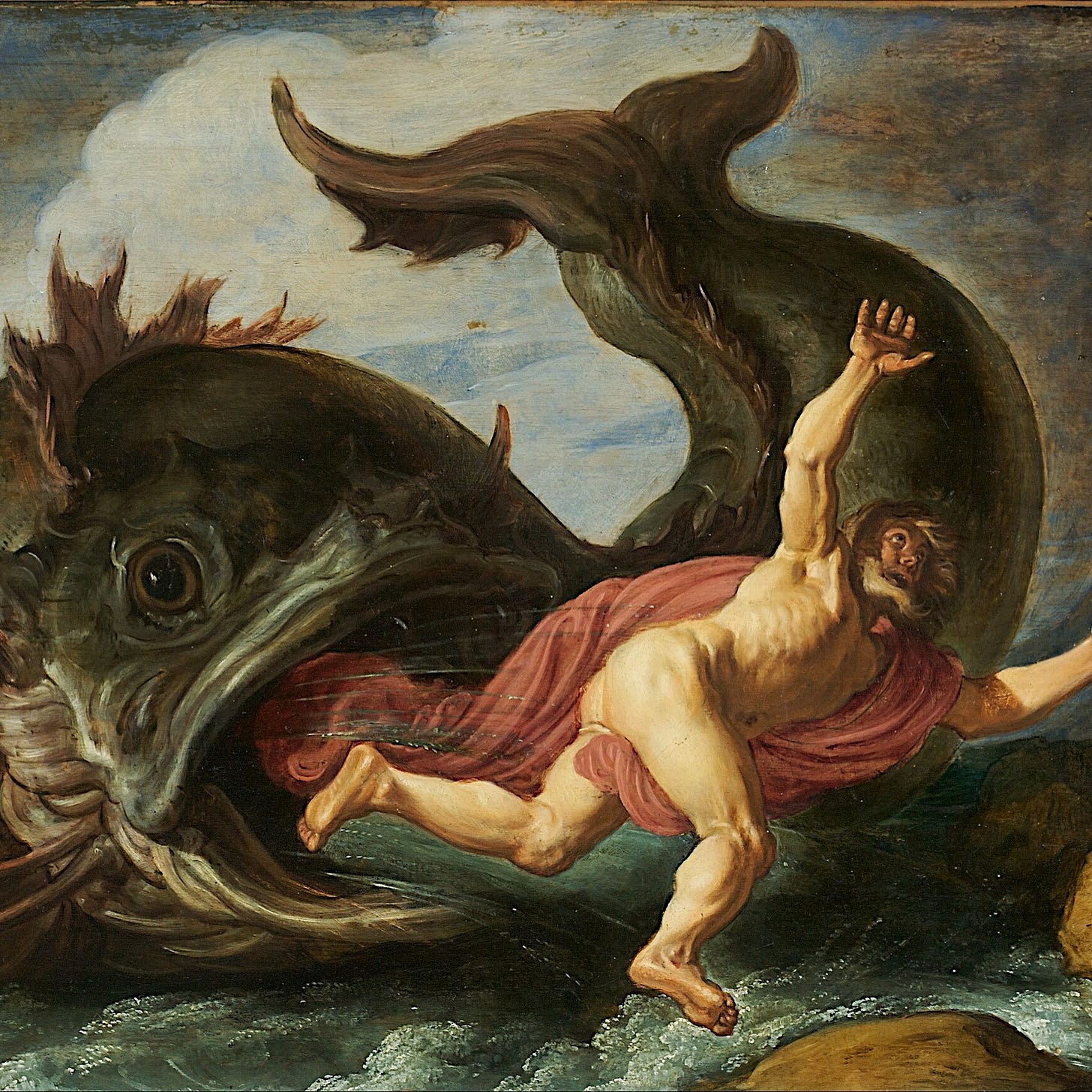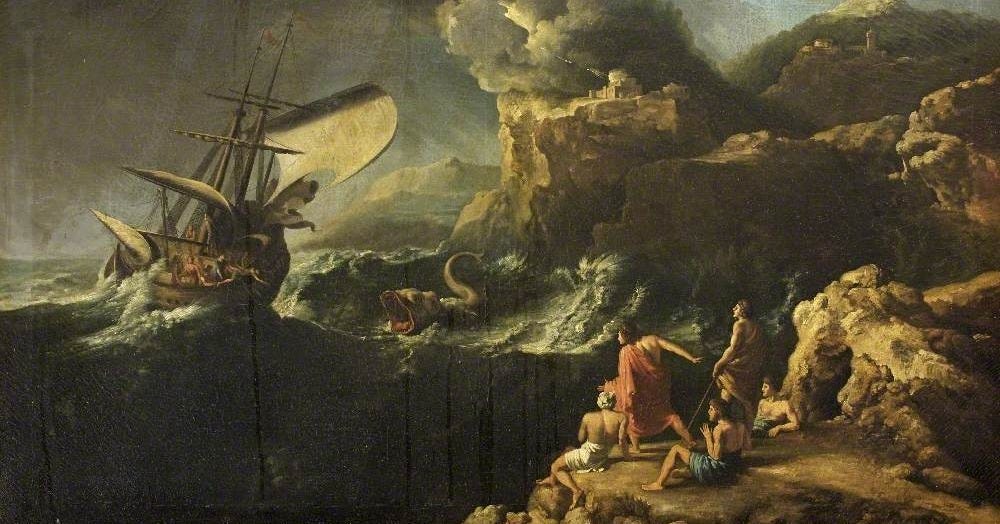Jonah Died in the Whale
The ancient tale of second chances
The death and resurrection of Jonah is an ancient tale of second chances.
Jonah, who rebelled against God, was tossed into the waves and swallowed by the great fish—and there he died. His soul sank into Sheol, the underworld, and he who had run from the Lord cried out to Him for deliverance.
And God heard his cry and raised him up again.
Christians read Jonah’s lifeless body in the whale as a sign of life without God—the chaos of this life overwhelms the soul, and it is swallowed by death.
Yet, God gives you Jonah as a sign of second chances—for Jonah sank into Sheol and into humility. His story is one of rebellion, repentance, and mercy. It is a prefigurement of Jesus’ own story, according to Jesus.
And Jonah’s rebirth was not just for his benefit but for those around him.
As Jonah’s second chance saved Nineveh, so too could yours save those around you.
Reminder: this is a teaser of our members-only deep dives.
To support our mission and get our premium content every week, upgrade for a few dollars per month. You’ll get:
New, full-length articles every Tuesday and Friday
The entire archive of members-only essays
Access to our paid subscriber chat room
The Secret of Jonah’s Prayer
You the know the story. God calls Jonah to preach repentance to the city of Nineveh, but he elects to run from God by sailing to Tarshish. During his voyage, God “hurled a great wind upon the sea,” and the ship suffered a significant storm (Jonah 1:4). After casting lots that fell upon Jonah, the others ask Jonah what must be done to quiet the storm. Jonah states: “Take me up and throw me into the sea; then the sea will quiet down for you” (Jonah 1:12). The sailors still attempt to row to land but, after pleading with God to not hold Jonah’s blood against them, they toss Jonah into the depths. And Scripture records:
And the Lord appointed a great fish to swallow up Jonah; and Jonah was in the belly of the fish three days and three nights (Jonah 1:17).
You may know this story… but you may not know Jonah’s prayer from inside the great fish. The passage is often overlooked, but a few Christians give this an attentive, subtle read that reveals an incredible insight. It reads, in pertinent part:
I called to the Lord, out of my distress,
and he answered me;
out of the belly of Sheol I cried,
and thou didst hear my voice…
I went down to the land
whose bars closed upon me for ever;
yet thou didst bring up my life from the Pit,
O Lord my God.
When my soul fainted within me,
I remembered the Lord;
and my prayer came to thee,
into thy holy temple (Jonah 2:1,6-7).
First, notice that Jonah is praying inside the great fish but is referencing a prior prayer, i.e., “I called to the Lord… and he answered me.” He is referencing a call to God that happened after being swallowed by the whale but prior to his present prayer. Second, note too that he cries from “Sheol,” which is the Hebrew name for the underworld—which is translated into “Hades” in the Greek Old Testament, the Septuagint (c. 250 BC). Third, Jonah tells you he went “down to the land whose bars closed upon” him forever—this is again a reference to Sheol, the unescapable land of the dead. Fourth, Jonah thanks God for bringing him up from “the Pit,” which is a poetic reference to the underworld as well (cf. Psalm 16:10). Fifth and finally, the phrase “my soul fainted” can mean exhaustion but can also mean “to die” (cf. Gen 37:21-22).
So, what does this all mean?
Jonah died. He was tossed from the boat and swallowed by the great fish—where he died and his body remained in the belly of the beast for three days and three nights (Jonah 1:17). During this time his soul went down to Sheol, the underworld, where he prayed to God for deliverance (Jonah 2:2), and God raised him from the dead—still inside the belly of the great fish. He then prays in gratitude for what God has done (Jonah 2:9), and God causes the great fish to vomit him out (Jonah 2:10).
It is a careful, attentive read that open the story to whole new details—and to powerful moral and allegorical lessons.
The Hidden Sense of Jonah’s Story
Like a house to its foundation, the allegorical sense is built upon the literal. You must understand what actually happened before you can understand the spiritual realities signified. With a clearer picture of Jonah’s death and resurrection, the story becomes alive with spiritual meaning.
Christians hold that water in the Bible often represents chaos, like the primordial waters of creation or their return in Noah’s flood. It is fitting that Jonah’s flight from God ends with him being tossed into what symbolizes chaos, as a life without God is disordered. Moreover, Noah was preserved by his ark, but Jonah, in his disobedience, is tossed from the boat. The great fish, as a dweller of this chaos, represents death and swallows Jonah—and Jonah dies, a fitting picture of the life without God.
Yet… Jonah cries out in Sheol and is brought back life.
It is a story of second chances—a story of rebellion that ends in forgiveness and restoration both for Jonah’s good and those in Nineveh.
But the story truly comes alive with Christ’s commentary on Jonah—and how Jonah is a prophetic image of Jesus’ own heroic mission (and of your spiritual journey).
Keep reading with a 7-day free trial
Subscribe to The Ascent to keep reading this post and get 7 days of free access to the full post archives.




